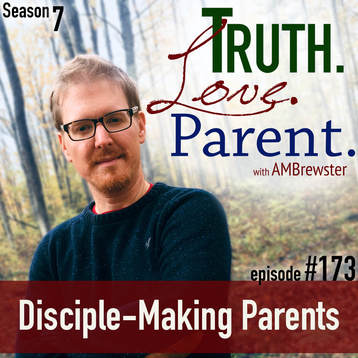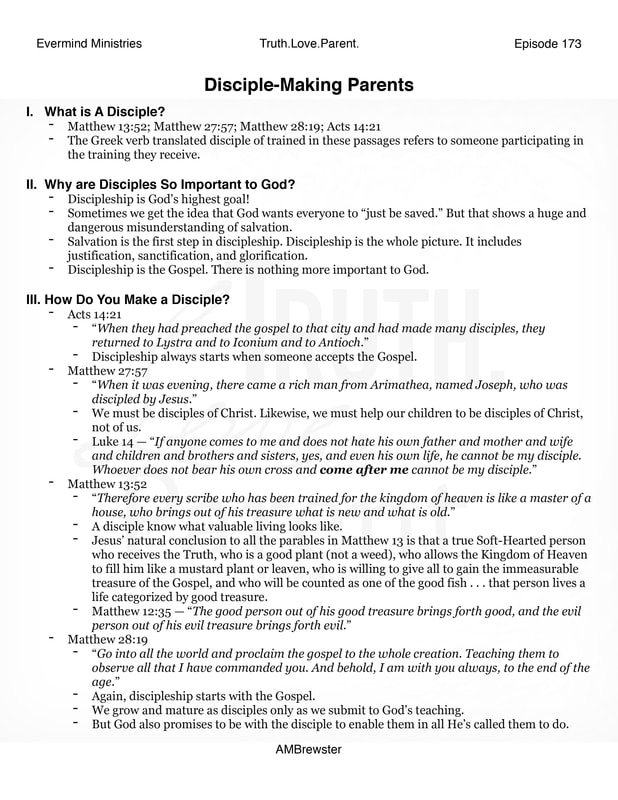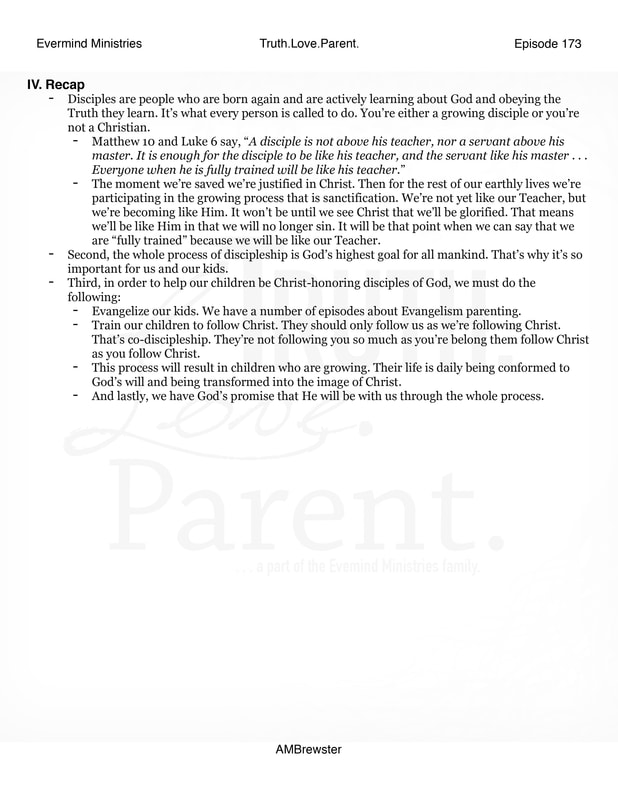 What does it mean to disciple your kids? Why is discipleships such a big deal in the Bible? How do you disciple someone? Today AMBrewster tackles these questions and more as he helps Christian parents discover the monumental and amazing responsibility we have to disciple our children. Check out 5 Ways to Support TLP. Like us on Facebook. Follow us on Twitter. Follow AMBrewster on Twitter. Follow us on Pinterest. Subscribe on YouTube. Need some help? Write to us at [email protected]. Click "Read More" for today’s Episode Notes and Transcript. Episode NotesTo download this document, please right-click and select "Save Image As." TranscriptIntroductionI hope our introduction to Season 7 last time was a huge encouragement to you. Everything we do at TLP is to help set your family free from sin and equip youth glorify God in all you do. That’s why today we’re discussing the in’s and out’s of being a disciple-making parent. But we’ll get to that in a minute. If you’ve been listening for any period of time and have not yet invested the couple of minutes it will take to leave us a review on iTunes, will you please plan a moment to do so? I was recently considering purchasing a product, but before I did, I read the customer reviews. You know what. I didn’t purchase it. When dads and moms scan through the many podcasts dedicated to Christian parents, it’s really helpful to read the reviews. They’re going to potentially invest a lot of time with any one podcast, and they like to know before they start whether or not it will be worth their time. When you share your thoughts about TLP, you’re helping them make a more informed decision, and your reviews are also a blessing to me and TeamTLP. So, again, please do that if you have not yet done so. I also want to take a moment to thank Mark and Carol for sending us a generous one-time monetary gift. Truth.Love.Parent. is a listener supported ministry, and there are 5 different ways you can support us. If you click on the “5 Ways to Support TLP” link in the description you’ll see that you can:
And we’d love for you to be a part of that mission. And speaking of being disciple-making parents, let’s talk about that right now. TopicFirst, let me say that there is so much that could be said about this topic. Books and books have ben written about the biblical concept of discipleship. But I don’t want to overload any of you. I want to encourage and equip you to understand what discipleship is and see that the first few steps are within your grasp. After that you will hopefully spend the rest of your life learning to be a better discipler, but at least you’ll be on your way. So, let’s begin by laying out our goals. Today we want to:
So, let’s dive right in. 1. What is a disciple? Well, when you search the scriptures for disciples or disciples, you’ll find around 280 occurrences. And the vast majority of those are nouns. But the whole concept of disciples seems to have been an easy concept to first century Christians because nowhere in the Bible does it really define what a disciple is. So, of course, we could look at all of the occurrences in order to build a definition. For example, in Matthew 10, Jesus gives this information: “A disciple is not above his teacher, nor a servant above his master. It is enough for the disciple to be like his teacher, and the servant like his master.” he says a similar thing in Luke 6, “A disciple is not above his teacher, but everyone when he is fully trained will be like his teacher.” And in Luke 14 Jesus says, “If anyone comes to me and does not hate his own father and mother and wife and children and brothers and sisters, yes, and even his own life, he cannot be my disciple. Whoever does not bear his own cross and come after me cannot be my disciple.” So, we could definitely proceed that way and learn a lot in the process. And — perhaps — we’ll have to do that some time. But, for now, I want to focus in on only four passages. These passages are interesting because they contain the Greek verb that means to make disciples. Let me read them for you. In Matthew 13:52 Jesus “Said to them, ‘Therefore every scribe who has been trained for the kingdom of heaven is like a master of a house, who brings out of his treasure what is new and what is old.’” In Matthew 27:57 we read, “When it was evening, there came a rich man from Arimathea, named Joseph, who also was a disciple of Jesus.” Of course we need to include Matthew 28:19, “Go therefore and make disciples of all nations, baptizing them in the name of the Father and of the Son and of the Holy Spirit.” And finally we have Acts 14:21, “When they had preached the gospel to that city and had made many disciples, they returned to Lystra and to Iconium and to Antioch.” Now, before we go back through each verse to mine the significance for today’s study, let’s talk about why I chose to focus the verb instead of looking at the noun. Intransitively, this verb means that the subject if becoming a pupil. Transitively, it refers to someone enrolling another as a student. In the KJV the word is translated “teach” twice, “instruct” once, and “be disciple” once. Acts 14:21refers simply to making many disciples. In the Great Commission Jesus commands us to make disciples. In Matthew 27:57, we learn that Joseph from Arimathea was a disciple of Jesus. This verse might be better translated, “Joseph, who also discipled by Jesus.” And then we have Mathew 13:52 which doesn’t use the word “disciple” are all. Instead it refers to a scribe having been “trained.” As we figure out what a disciple is, it’s important to understand that this Greek verb refers to someone entering into training. I highly, highly, highly encourage you to listen to episode 94, “Train Your Children to Stay with God.” If we do not understand the biblical concept of training, we will continue to fail as parents. Training is requires at least two people actively participating. It’s not an active endeavor for the teacher and a passive process for the student. Both parties must be investing if can be considered training. A disciple is not merely a student. As we saw last time, if we abide in God’s words and become His disciple, our lives are going to be changed. And that leads us to our second big idea of the day. 2. Why are disciples so important to God? Discipleship is God’s highest goal! Sometimes we get the idea that God wants everyone to “just be saved.” But that shows a huge and dangerous misunderstanding of salvation. Salvation is the first step in discipleship. Discipleship is the whole picture. It includes justification, sanctification, and glorification. Discipleship is the Gospel. There is nothing more important to God. It’s true that God takes us as we are, but He will never leave us as we are. If we or our spouses or children are exactly the same person we were when we professed Christ then we are not disciples, we are not His followers, and we’re not born again. As an Ambassador parent, you have no higher calling than to disciple your kids. Now, I could continue to wax passionate about this, but lets transition into the practical. 3. How do we make disciples? Let’s start with the Acts 14:21, “When they had preached the gospel to that city and had made many disciples, they returned to Lystra and to Iconium and to Antioch.” First, discipleship starts at conversion. The Gospel, the Good News, must first be preached and accepted. Second, let’s consider Matthew 27:57. “When it was evening, there came a rich man from Arimathea, named Joseph, who was discipled by Jesus.” God does not want your children to be disciples of you. He wants them to be His disciple. You must be His Ambassador, His First-Follower in your home. You should be training your children to be His disciple. This is why Luke 14 says, “If anyone comes to me and does not hate his own father and mother and wife and children and brothers and sisters, yes, and even his own life, he cannot be my disciple. Whoever does not bear his own cross and come after me cannot be my disciple.” If the idea of a First-Follower is new to you, please further this study by listening to episode 7 which is called, “Stop Being the Leader!” So, we need to start with the Gospel and then remember whose disciple our children must be. Third, we need to look at Matthew 13:52. In this chapter, Jesus has spoken a number of parables. It starts with the parable of the soils which we talked about in great detail on our Four Children series. This parable opens up explaining how people will respond to Christ’s words. Then he talks about a man who sows good seed, but someone else comes in a sows weeds. Jesus wants everyone to know that there will be people who think they’re on the good side, when in actuality they’ve been put there by the enemy. And in the end, the weeds will be bundled up and burned. He then talks about how the Kingdom of Heaven is like a mustard seed and leaven which both permeate the space in which they exist. Then Jesus tells the parable of the hidden treasure and the pearl of great value. These parables talk about the value of the Kingdom of God. Then there’s the parable of the net which is very similar to the one about the weeds. Fisherman collect all the fish, keep the good and destroy the bad. And then we come to the parable of the New and Old Treasures. After telling all the other parables, Jesus starts in verse 51 with “Have you understood all these things?” They said to him, “Yes.” “And [then] he said to them, ‘Therefore every scribe who has been trained for the kingdom of heaven is like a master of a house, who brings out of his treasure what is new and what is old.’” After all of that talk about how people respond to Truth and how there will be deceivers and the deceived and how the good will be separated from the bad, Jesus points out that someone who is a disciple knows what valuable living looks like. He’s the master of his house (his behavior) and he only brings out the treasures, whether new or old. I went through all of that because it was Jesus’ natural conclusion to all of those parables that we realize that a true Soft-Hearted person who receives the Truth, who is a good plant (not a weed), who allows the Kingdom of Heaven to fill him like a mustard plant or leaven, who is willing to give all to gain the immeasurable treasure of the Gospel, and who will be counted as one of the good fish . . . that person lives a life categorized by good treasure. Like Matthew 12:35 says, “The good person out of his good treasure brings forth good, and the evil person out of his evil treasure brings forth evil.” So, we see that discipleship starts with salvation, requires submission to Christ, and exhibits itself in a change life that is acceptable and valuable to God. And lastly we’re going to look at Matthew 28 to learn more about this process. In verse 19 we read, “Go therefore and make disciples of all nations, baptizing them in the name of the Father and of the Son and of the Holy Spirit.” In Mark 16:14, Jesus says, “Go into all the world and proclaim the gospel to the whole creation.” Again, discipleship is the Gospel. Salvation is the beginning of discipleship. This is why baptism is part of making disciples. And then in verse 20 we read, “Teaching them to observe all that I have commanded you. And behold, I am with you always, to the end of the age.” Here we have one more reminder that the disciples we make must be disciples of God, not us. Teach them to observe all that God has commanded you. And then the passage ends with the wonderful promise that what God expects, He empowers. Jesus promised, “I am with you always, to the end of the age.” Before we recap this, let remind you that all of this will be laid our nice and neat on our free episode notes at out blog, Taking Back the Bible. ConclusionOkay, so disciples are people who are born again and are actively learning about God and obeying the Truth they learn.
It’s what every person is called to do. You’re either a growing disciple or you’re not a Christian. Do you remember Matthew 10 and Luke 6? Jesus said, “A disciple is not above his teacher, nor a servant above his master. It is enough for the disciple to be like his teacher, and the servant like his master . . . Everyone when he is fully trained will be like his teacher.” The moment we’re saved we’re justified in Christ. Then for the rest of our earthly lives we’re participating in the growing process that is sanctification. We’re not yet like our Teacher, but we’re becoming like Him. It won’t be until we see Christ that we’ll be glorified. That means we’ll be like Him in that we will no longer sin. It will be that point when we can say that we are “fully trained” because we will be like our Teacher. Second, the whole process of discipleship is God’s highest goal for all mankind. That’s why it’s so important for us and our kids. And third, in order to help our children be Christ-honoring disciples of God, we must do the following:
Now, they say you’re not supposed to add any new information to your conclusion, but there’s one more thing I want to share with you before we’re done. But first, don’t forget to share this episode on Facebook. Every Christian parent needs to be a disciple-making parent. And join us next time as we discuss “The Sufficiency of Scripture in Parenting.” I’m really looking forward to this one because it builds on the words of Christ when He commanded that as we make disciples we do so by “Teaching them to observe all that [He’s] commanded [us].” Now, the last thing I do in every show is give you hope for the day and decisions and parenting struggles ahead. Let me end today with an anecdote designed to give you hope. At my last ministry I counseled families across a desk. Generally, my counsel was preemptive. “This is what you’re going to need later today.” However, once I moved to Victory I loved the fact that my counseling is in the moment, in the kitchen, in the bedroom, at the dining room table, it’s present and meets the need of the hour. And as I reflected on Christ’s discipleship model, I realized that the parent/child dynamic is the closest thing to Christ’s discipleship model that we have. Unless you’re planning on moving in with and experiencing life with a bunch of complete strangers for the process discipling them . . . parenting is it. That’s exciting. Family life was designed by God to facilitate discipleship. Discipling our children, therefore, should be easier than discipling anyone else. If we do it the right way and follow Christ’s example, we truly can be intentional, premeditated, disciple-making parents. To that end . . . I’ll see you next time.
0 Comments
Leave a Reply. |
Receive UpdatesJoin The TLP Family and receive email updates when we publish new articles and episodes.
Subscribe to Our PodcastCategories
All
Archives
July 2024
|
Truth.Love.Family.
- Truth.Love.Family.
- Donate
-
Podcast
-
Special Guests
>
- Ryan & Kim Ahrens
- Scott & Becky Aniol
- George Barna
- Dave Bender
- Alan Benson
- Carolyn Brewster
- Tim Challies
- Natasha Crain
- Kristen Clark
- Hillary Morgan Ferrer
- Todd Friel
- Ken Ham
- Jay Holland
- Kristen Jenson
- Chris Kaspar
- Becky Keife
- Heath Lambert
- Jessica Mair
- Dr. Joe Martin
- Mark Massey
- Katie Miller
- Jim Newheiser
- Steve Pettit
- Shannon Popkin
- Aaron & Elaina Sharp
- Mark Shaw
- Lynna Sutherland
- Nathan & Anna Sutherland
- Brandon Talley
- Arthur C. Woods
- Episodes by Series
- Episodes by Topic
- Where to Listen
-
Special Guests
>
- Community
-
Resources
- Counseling
- Speaking
- The Celebration of God
- AMBrewster.com
- Evermind Store
|
To submit general questions or ideas for future episodes: [email protected]
To request specific assistance for your family: [email protected] |
We are a participant in the Amazon Services LLC Associates Program. As an Amazon Associate, we earn from qualifying purchases. Click any Amazon link at TruthLoveParent.com, shop as usual, and TLP will receive commissions off all of your sales! Click here to learn more.
Site powered by Weebly.






 RSS Feed
RSS Feed
